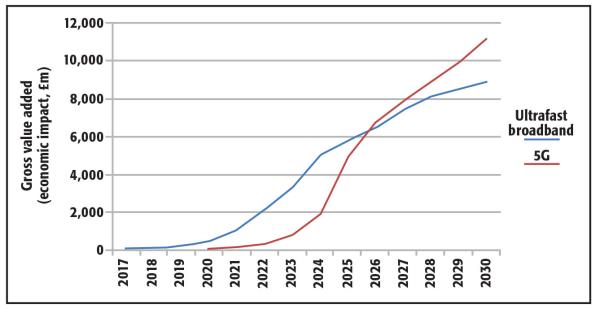14 March 2017

Right-click to open in new tab
5G infrastructure will outstrip the economic benefits of fixed fibre broadband in the UK by 2026, according to a new report by O2. It comes as Ofcom outlined its schedule that will lead to the commercial launch of fifth generation mobile services in 2020.
O2’s report, Tech-onomy: measuring the impact of 5G on the nation’s economic growth, predicts the effects of digital connectivity on post-Brexit Britain. The study and associated socio-economic modelling was conducted by independent research consultancy Development Economics.
O2 says it drew on existing economic data inputs, a “comprehensive” literature review, and stakeholder interviews to estimate the future economic trajectories of both mobile and broadband connectivity.
The report states that the 5G network will introduce entirely new industries, platforms and services. In addition to £7bn of direct economic value through businesses using 5G, the ‘ripple effect’ through the supply chain will also see it indirectly boost the nation’s productivity by an extra £3bn a year.
O2 also believes that the added value of 5G to the economy will become apparent almost twice as quickly as fibre broadband (see graph). Despite fibre broadband rollouts already taking place and 5G not scheduled for launch until 2020, the latter is forecast to achieve the same economic benefits as fibre by 2026.
Citing data from Ofcom, O2 says more than four in every five adults in the UK now owns a smartphone and nearly three quarters use a mobile device to access the internet on the go. It says the combined value of 4G and 5G connectivity will add £18.5bn to the economy in less than a decade, compared to £17.5bn for broadband overall.
“Mobile is the invisible infrastructure that can drive the economy of post-Brexit Britain,” says O2 CEO Mark Evans. “The future of 5G promises a much quicker return on investment than fibre broadband, and a range of unprecedented benefits: from telehealth applications to smarter cities and more seamless public services.”
Later this year, Ofcom will launch its spectrum auction to release new airwaves to meet growing demand for mobile connectivity. 190MHz of spectrum in the 2.3GHz and 3.4GHz bands will be auctioned – an increase of just under a third of the total mobile spectrum currently available.
Those behind the ‘MakeTheAirFair’ campaign, which is led by Three UK and includes a number of telecoms service providers, say that no one mobile network should be allowed to own more than 30 per cent of spectrum (see News, p3, Dec 2016).
To aid competition, Ofcom has proposed that BT/EE – which, at 45 per cent, currently holds the largest proportion of usable spectrum – cannot bid for the frequencies in the 2.3GHz band that will become immediately available.
But O2 believes the regulator’s measures do not go far enough to foster a fully competitive market. It has called for a cap on overall spectrum ownership of 35 per cent and also says Vodafone, which holds the second largest proportion of spectrum (28 per cent), should be restricted to no more than half of this frequency.
“For individuals, businesses and communities to use mobile connectivity to its full potential, we need to set the right conditions to ensure a competitive and fair mobile marketplace,” says Evans.










